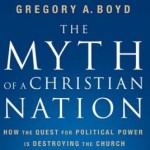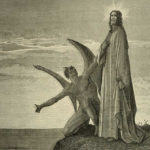We run our website the way we wished the whole internet worked: we provide high quality original content with no ads. We are funded solely by your direct support. Please consider supporting this project.

Christians & Politics: Where Do You Stand?
In the 1980’s, Cal Thomas and Ed Dobson were leaders in the Moral Majority, a conservative evangelical social and political movement that attempted to rally “moral” people to change public policy. The movement died out in the 1990s. In 1999, Thomas and Dobson wrote a book entitled Blinded by Might in which they declare that they shifted their convictions and argued that Christians should not try to change culture primarily by influencing the political system. They should rather rely on the power of the gospel to change lives, one at a time. Christianity becomes corrupted, they argued, when it becomes overly involved in the politics of the world.
The perspectives of Thomas and Dobson illustrate how Christians throughout history have embraced a number of perspectives on this issue. The common approaches can be broken down into three groups.
First, some Christians believe that one of the jobs of the church is to transform and ultimately control politics. This view has often been labeled the transformational model and has been the dominant view among Calvinists. It was also popular with most nineteenth-century revivalists, like Finney and Moody, and the church throughout the Middle Ages. Since God is Lord of everything, Christians should seek to manifest this lordship in everything, including politics. They should therefore use any righteous means possible to sanctify the political system and seek to pass laws that reflect God’s will for people as revealed in Scripture.
Second, some operate according to the two two-kingdoms model of church and state. This has been the primary view of Lutherans and arguably the dominant view among American Christians. This model holds that “secular” politics are under God’s authority. However, unlike the transformational model above, it does not hold that the politics of the world should be or can be transformed into a Christian system. Rather, secular government and the church are two ways that God works in the world, and they accomplish different purposes. The purpose of secular government is to keep sin in check and rule over sinners by force. The purpose of the church is to transform sinners into saints who do not need to be ruled by law. Christians may or may not get involved in government, depending on their calling from God. But they should not think that any alterations they make in government, however laudable, will further the purpose of transforming lives the way God wants to transform them.
The final perspective is embraced by those who believe that Christians should not involve themselves at all in secular politics or at least should be wary of doing so. This is an oppositional model that has been the traditional view among Anabaptists. Christ said his kingdom is not of this world, and he never involved himself in the political debates of his day (John 18:36). Christians are called to be loyal to Christ’s kingdom alone and to see themselves as citizens and ambassadors of the kingdom of God while living in a “foreign” land (Phil 3:20). The present world, including its political systems, is under the control of Satan. Therefore, trying to conform it to God’s will is futile and even dangerous. The power of the gospel is found in offering an alternative way of living, not in influencing the political process.
Which option do you embrace?
—Adapted from Across the Spectrum, pages, 304-305
Photo credit: derekbruff via Visual Hunt / CC BY-NC
Category: General
Tags: Christian Living, National Idolatry, Politics, Power
Related Reading

Oh Constantine
Once upon a time there was a Roman Emperor named Constantine who used the enemy-loving Jesus to kill his enemies. What does this have to do with us? Find out:

The myth clouds our vision of God’s distinctly beautiful kingdom… [Quotes]
“Instead of living out the radically countercultural mandate of the kingdom of God, this myth has inclined us to Christianize many pagan aspects of our culture. Instead of providing the culture with a radically alternative way of life, we largely present it with a religious version of what it already is. The myth clouds our vision of God’s distinctly beautiful kingdom and thereby undermines our motivation to live as set-apart (holy) disciples of this kingdom.”

In a democracy, don’t Christians have a responsibility to participate in politics?
Question: You’ve argued that Christians shouldn’t try to gain power in government on the grounds that Jesus didn’t try to gain power in the political system of his day. But his government didn’t allow for such power. Caesar and Pilate weren’t elected by anyone. Our government allows for this. So don’t we have a responsibility…

Xmas
Kevin Dooley via Compfight Zach Hunt brings a huge challenge in this article about the ongoing lament about the “liberal attack on Christmas.” Maybe the real problem is not with the media or the “liberals” or the merchants, but with us. There’s an opportunity here for us to remember who we really are and what…

The Patriot’s Bible — Really?
Have you ever seen the Saturday Night Live skit entitled “Really? With Seth and Amy”? Sometimes it’s pretty funny. I was thinking that perhaps the best way to get through my critique of The American Patriot’s Bible (henceforth Patriot’s Bible) would be to give a “Really?” type report on it. I want to preface my…

Jesus was Not a [Socialist]
Article by Dan Kent Our political climate right now exhausts me. The fracturing. The bullying. The ideological mobs. I feel like I’m surrounded by a hundred Towers of Babel babbling at me all day long, pummeling me with endless propaganda and page-after-page of facts. “Look at the facts!” they implore. They want me in their…
